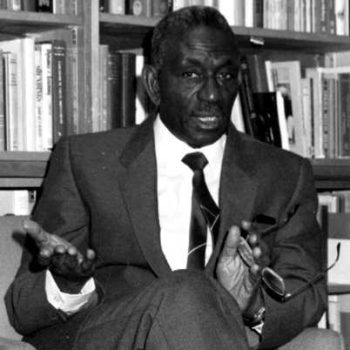Cheikh Anta Diop (1923–1986) was a Senegalese historian, physicist, and anthropologist who gained international recognition for his work in challenging and reevaluating conventional views on African history and culture. His interdisciplinary approach combined scientific methods with a deep understanding of African languages and cultures.
Cheikh Anta Diop was born on December 29, 1923, in Thieytou, in the Diourbel region of Senegal. His family had Wolof aristocratic origins. At the age of 23, he went to Paris to study physics and chemistry but also delved into history and social sciences. He attended lectures by Gaston Bachelard and Frédéric Joliot-Curie. Diop adopted a specifically African perspective in response to the view held by some authors of the time that Africans were people without a past.

In 1951, under the supervision of Marcel Griaule, Diop prepared a doctoral thesis at the University of Paris in which he asserted that ancient Egypt was inhabited by black Africans and that Egyptian language and culture later spread to West Africa. Initially facing difficulty in forming a jury, his thesis, titled “Nations nègres et culture” (Black Nations and Culture), was published in 1954 and garnered significant attention. He eventually obtained his doctorate in 1960. Concurrently, he specialized in nuclear physics at the Laboratory of Nuclear Chemistry at the Collège de France. Diop utilized his multidisciplinary training to combine various approaches.
Drawing on ancient authors like Herodotus and Strabo, Diop argued that ancient Egyptians exhibited the same physical traits as present-day black Africans (skin color, hair, nose, and lips). His interpretation of anthropological (such as the role of matriarchy) and archaeological data led him to conclude that Egyptian culture was of African origin. Linguistically, he considered Wolof, spoken in West Africa today, to be phonetically related to ancient Egyptian.
Upon earning his doctorate in 1960, Diop returned to Senegal to teach as a lecturer at the University of Dakar (now named Cheikh Anta Diop University, UCAD). In 1966, he established the first African laboratory for radiocarbon dating of archaeological fossils at the University of Dakar, in collaboration with the French Atomic Energy Commission (CEA) in Gif-sur-Yvette. He conducted melanin tests on samples of skin from Egyptian mummies, aiming to confirm ancient Greek accounts of the dark pigmentation of ancient Egyptians.
In the 1970s, Diop participated in the scientific committee directing the UNESCO project “General History of Africa.” After the 1974 International Colloquium in Cairo, he was entrusted with writing the chapter on the origin of the ancient Egyptians. The final report acknowledged the agreement among specialists, except for one dissenting voice, regarding the contributions of Diop and Théophile Obenga on the connection between ancient Egyptian and African cultures. The scientific community remained divided on the nature of the population of ancient Egypt.
Politically active since 1947, Diop advocated for African independence and the formation of a federal state in Africa. He played a crucial role in the political engagement of many African intellectuals in France. He was a key figure in the democratization of political discourse in Senegal, opposing Léopold Sédar Senghor’s regime and creating political parties, an opposition journal, and a farmers’ union.
Cheikh Anta Diop passed away in his sleep in Dakar on February 7, 1986. Alongside Théophile Obenga and Asante Kete Molefe, he is considered one of the inspirations for the Afrocentric epistemological movement. In 1966, at the first World Festival of Black Arts in Dakar, Diop was recognized as the “African author who has exerted the most influence on the 20th century.”
On February 8, 2008, the Minister of Culture of Senegal, Mame Birame Diouf, inaugurated a mausoleum in Thieytou, Diop’s hometown, where he rests. The mausoleum is listed among the classified sites and monuments of Senegal.
Learn more about Cheikh Anta Diop here: http://www.cheikhantadiop.net/
Source: https://www.presenceafricaine.com/44_diop-cheikh-anta




